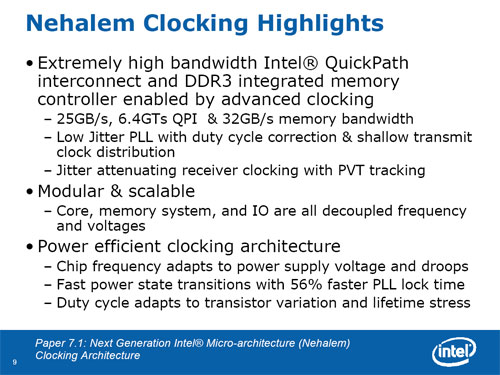Rajesh Kumar, Intel's director of circuit and low power technologies, was on hand yesterday to give us a brief overview of Nehalem's clocking highlights, as detailed in a forthcoming Intel paper.
The highlight, as you might have guessed, was Intel's "high-speed, point-to-point, coherent, Intel QuickPath interconnect for communication between CPUs, chipsets, and I/O hubs."
A direct result of Nehalem's new integrated components is much higher memory bandwidth and lower latency. Kumar stated that we can look forward to "25GiB/s socket to socket bandwidth, and 32GiB/s for main memory."
"That's 3x faster than our competition," he added.

Kumar emphasised Nehalem's scalability as it plans to feature in mobile, desktop and server environments. "The number of cores and most of its features are modular. You can change the number of cores in different segments", he said.
Nehalem's CPU, memory and IO frequencies and voltages can all be set independently - this, however, isn't a new technology, admits Kumar. What is new, is Intel's implementation. "Most people that have tried this idea have done this using what are called asynchronous interfaces which happen to be fairly slow. So the main idea is how to do all of this in a synchronous fashion with very low latency and high performance," he added.
Power efficiency is at the forefront once again and he detailed Nehalem's advantages as follows:
"Energy efficiency and power efficiency is front and centre in everything we have done for Nehalem."
"The idea here is of adaptability, today, if i look at chips today, they run at a given frequency at a given voltage. But as we know, when running different applications, a current a given product draws keeps changing. Our chips today don't react to it and hence have to have huge guardbands in terms of what frequency and voltages they can run at."
"What we have introduced here is a chip whose frequency keeps adapting every cycle to the dynamic and real time power supply it actually sees. By doing so, eventually we get at a given voltage, higher frequencies, or at a given frequency, lower voltage, both of which are very very useful for getting power efficiency."
Related reading
Mainstream Nehalem chips in Q4 '08, says leaked Intel roadmap













